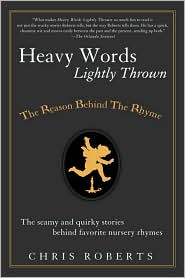 Remember learning nursery rhymes when you were a kid? Ever wonder what Jack and Jill were doing? Ever think that maybe Andrew Dice Clay was onto something? Then Heavy Words Lightly Thrown: The Reason Behind the Rhyme: The seamy and quirky stories behind favorite nursery rhymes by Chris Roberts is the book for you.
Remember learning nursery rhymes when you were a kid? Ever wonder what Jack and Jill were doing? Ever think that maybe Andrew Dice Clay was onto something? Then Heavy Words Lightly Thrown: The Reason Behind the Rhyme: The seamy and quirky stories behind favorite nursery rhymes by Chris Roberts is the book for you.Jack and Jill went up the hill,
To fetch a pail of water.
Jack fell down and broke his crown,
And Jill came tumbling after.
One saucy explanation of this rhyme is that "up the hill to fetch a pail of water" is actually a euphemism for having sex and that "losing your crown" means losing your virginity (in much the same way that people might "go to see a man about a dog" or get up to ab it of "how's your father" if they want to be vague about what they are doing). So here you have a rhyme about a young couple slipping off for a bit of "slap and tickle" and the regrets that come later. This may explain why Jill is the one most severely punished in the additional verses once her mother realizes that she has been frolicking in the hills with jack. It is interesting that Jack runs off rapidly, probably to tell his mates about what happened.
Read through the book, and you'll learn that "Here We Go Round the Mulberry Bush" has to do with "suicide, sex, and gaol" (that's "jail", for those unfamiliar with the British spelling), that "Goosey, Goosey, Gander/whither shall I wander?/Upstairs and downstairs/And in my lady's chamber" is about prostitutes (geese) and sexually transmitted diseases, and "Little Jack Horner" relates the true story of a man named Thomas Horner who swiped the deed for a prime piece of real estate out of a pie intended for King Henry VIII.
Some of the rhymes have clear historical origins; others are murkier, and in those cases, Roberts presents the various theories. In some cases, he wanders a bit afield, but it's always interesting and entertaining to see where he goes. For instance, there's his explanation of "Yankee Doodle", in which he encourages the reader as follows:
The "Yankee Tootle" or "Yankee Doodle" was originally an English take on American folk musix, composed to be played on the flute or whistle. The words, which were added later, were really secondary to the tune and were ad-libbed in the manner of a rapper, just to keep the dance hall jumping. If you can't see it as a dance-hall tune, try setting the following version from 1775 to a reggae rhythm and reading it out loud in a Jamaican accent:(Of course, he also explains that historical meaning of the word "macaroni", which was used to describe a group of influential-if-pretentious dandies in London in the 18th century.)
Yankee Doodle keep it up,
Yankee Doodle Dandy,
Mind the music and the step,
And with the girls be handy.
Definitely an entertaining look at the origins of songs and rhymes we've all grown up with, and worth a look if you're interested in wordplay, history, or the humor to be found when one knows what it is we're actually teaching small children.

No comments :
Post a Comment